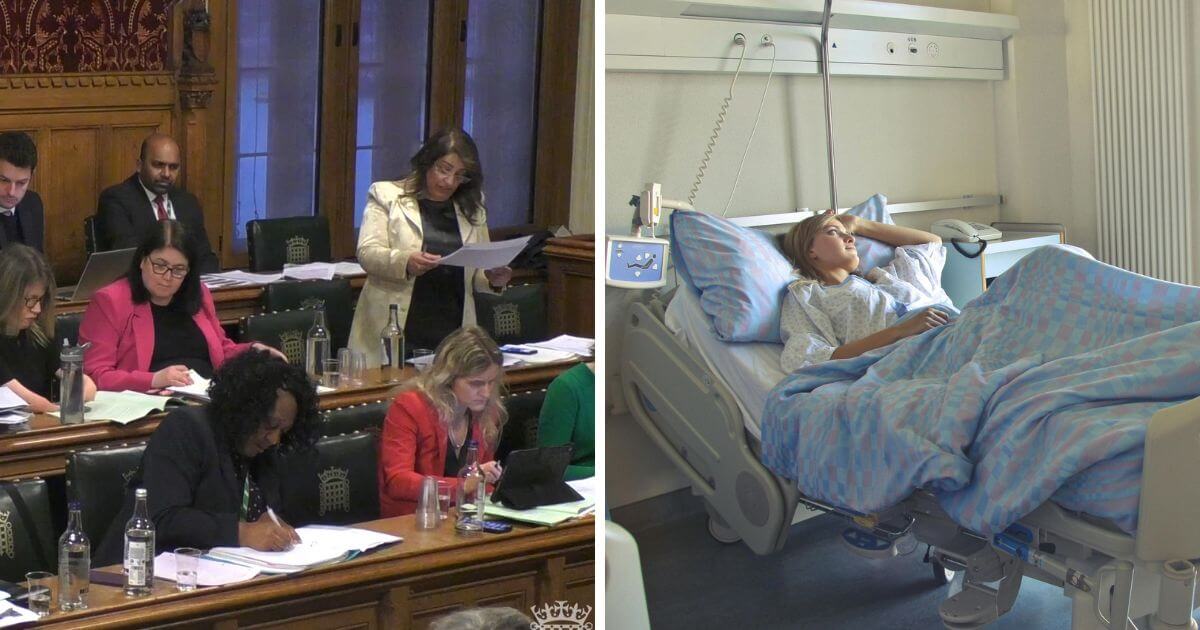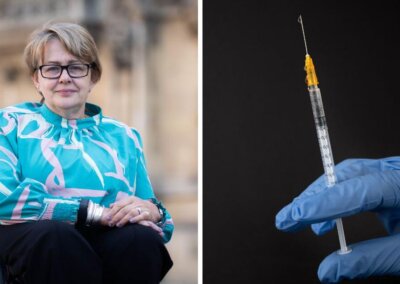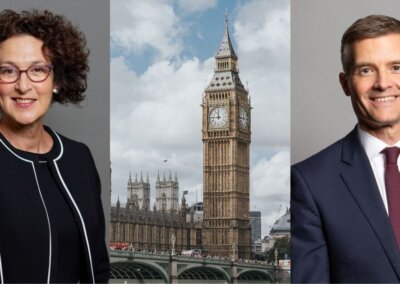People with anorexia could be eligible for assisted suicide after the assisted suicide Bill Committee chose not to close a loophole in Kim Leadbeater’s Terminally Ill Adults (End of Life) Bill, according to eating disorder charities.
The Committee rejected an amendment, supported by 34 representatives from eating disorder charities, designed to explicitly prevent people with anorexia from being eligible for assisted suicide.
Labour MP Naz Shah proposed an amendment to clarify that a person who “would not otherwise” qualify as terminally ill “shall not be considered to meet those requirements as a result of stopping eating or drinking”. The amendment was rejected, sparking eating disorder experts’ disappointment.
Chelsea Roff, the founder of Eat Breathe Thrive, told The Daily Telegraph: “We are extremely disappointed that the committee has chosen not to close the loopholes in this Bill that put people with anorexia at risk”.
Writing on X, Roff stated that “[T]he committee rejected every amendment that could have stopped people with eating disorders from qualifying for assisted death — ignoring all expert evidence submitted on this topic”.
The dangers of anorexia sufferers being eligible for assisted suicide
Before the session on Tuesday, MPs received a letter from 34 “campaigners, clinicians, charities, and organisations” concerned with eating disorders who outlined their concerns, saying “The bill does not contain any provisions to prevent individuals with eating disorders from being classified as “terminally ill” based on the physical consequences of their condition, should they decline or be unable to access treatment”.
The representatives “urge[d] the committee” to “ensure this bill does not put people with eating disorders at risk of premature death under the guise of assisted dying”.
The danger of anorexia sufferers being eligible for assisted suicide was highlighted during the Committee’s scrutiny of the Bill. Quoting the Royal College of Psychiatrists, Rebecca Paul MP pointed out that, although anorexia nervosa “does not itself meet the criteria for terminal illness” the “physical effects (for example, malnutrition) in severe cases could be deemed by some as a terminal physical illness, even though eating disorders are treatable conditions and recovery is possible even after decades of illness”.
Naz Shah reiterated the warning, outlining the danger of anorexia sufferers being eligible for assisted suicide under the Bill “if they had a mental health condition such as anorexia nervosa and a physical condition such as malnutrition”. Shah added “[T]hat means that somebody with anorexia nervosa could stop eating until they suffered so badly from malnutrition that two doctors prognose that the patient is likely to die within six months. That person, under the Bill, would then qualify for assisted dying”.
Shah said “If we wish to protect people with anorexia and other eating disorders, we must rewrite the Bill. We must ensure that people who have those disorders, and who also have a physical disorder, cannot qualify for assisted dying”.
“Anorexia is treated as a terminal illness in parts of the NHS today”
Leading opponent of the assisted suicide Bill and Conservative MP, Danny Kruger, reminded the Committee that anorexia sufferers are being given “diagnoses of terminal anorexia” and warned that “anorexia is treated as a terminal illness in parts of the NHS today”.
Despite the evidence offered, including written evidence previously submitted by a range of eating disorder experts, the amendment was rejected.
Chelsea Roff pointed to international evidence regarding the dangers of assisted suicide for those with eating disorders (EDs). Roff previously published a study that identified “at least 60 patients with EDs who underwent assisted dying between 2012 and 2024” in countries with assisted suicide and/or euthanasia.
She said “The international evidence is clear – assisted dying laws have already been exploited to help young women with eating disorders die by assisted death in Oregon, California, and Colorado. Even when presented with that evidence, some members of the committee have chosen to ignore it”.
Roff added “MPs may think such cases would never happen here. So did lawmakers in Oregon. We are urging the MPs to act now to ensure similar tragedies don’t happen here”.
Evidence from Oregon confirms Roff’s point. In a review of the assisted suicide data from Oregon over the last 25 years, published by leading academics in the journal BMJ Supportive & Palliative Care, the academics found that “[s]ince 2010, patients with a range of non-cancer diagnoses have received [physician assisted suicide] including non-terminal illnesses such arthritis, arteritis, complications from a fall, hernia, sclerosis, ‘stenosis’ and anorexia nervosa”.
In December 2021, a 33-year-old Dutch woman had her life legally ended through euthanasia because she was suffering from anorexia.
“Those struggling with eating disorders are being overlooked”
Eating disorder charities expressed disappointment that the amendment failed to pass, stating that those struggling with eating disorders were being “overlooked”.
Gemma Oaten, Chief Executive Officer and Patron of SEED (Support and Empathy for people with Eating Disorders), said “Once again, those struggling with eating disorders are being overlooked, despite our relentless efforts to bring attention to this critical issue”.
Tom Quinn, Director of External Affairs at eating disorder charity Beat, said “Eating disorders should never be classified as terminal, and this amendment would have added much-needed clarity around the issue”.
Spokesperson for Right To Life UK, Catherine Robinson, said “The Leadbeater assisted suicide Committee rejected amendments designed explicitly to prevent people with anorexia from being eligible for assisted suicide as they have been elsewhere”.
“Whilst MPs might believe people with eating disorders will not be helped to die, evidence from Oregon and the Netherlands tells a different and sinister story”.
“Introducing legislation that unintentionally permits assistance in suicide for people with eating disorders is reckless. MPs must act immediately to prevent this dangerous Bill from progressing and should vote it down at Third Reading”.












